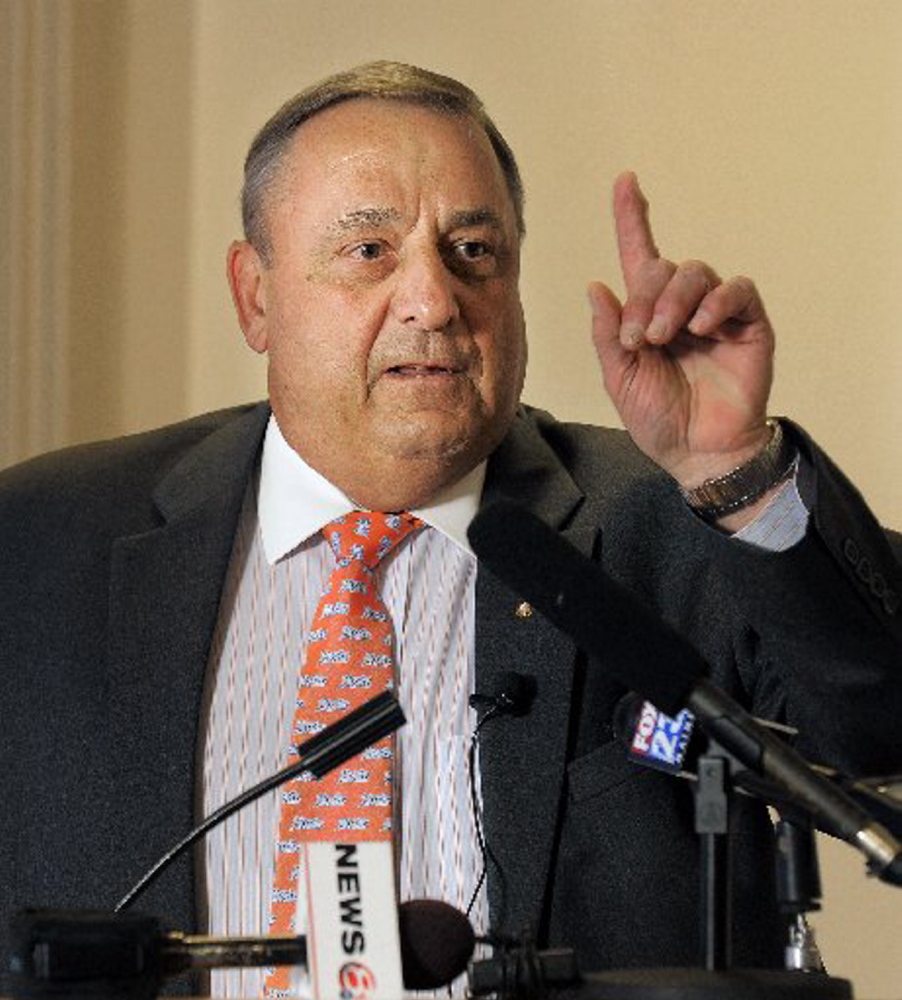AUGUSTA — Gov. Paul LePage wants to cut about 2,300 jobs from the state workforce during the next two-year budget cycle, according to an internal administration memo circulated by a top adviser.
The governor has set a ceiling target of 9,500 state employees, the memo said. That would require a decrease of nearly 20 percent.
As of Tuesday, there were 11,810 executive branch positions on the state’s payroll, said David Heidrich, a spokesman for the state Department of Administrative and Financial Services. That figure does not include employees of the Maine National Guard, Maine Turnpike Authority, state Legislature, Maine Judicial Branch, the University of Maine System, the Maine Community College System, the Finance Authority of Maine and some other quasi-independent agencies, Heidrich said.
The memo did not say how much money the state might save through the job cuts.
The state’s largest employees union quickly criticized the proposal.
“These cuts would add additional stress on an already greatly reduced workforce and further compromise our ability to deliver the quality public services Maine citizens deserve,” Ramona Welton, president of the Maine State Employees Association, said in an emailed statement. The union represents about 8,000 state workers.
Other goals outlined in the memo include reducing state spending below the current level – $6.7 billion for the fiscal 2016-17 budget cycle – and slashing the state income tax rate for top earners from 7.15 percent to 5.75 percent.
The memo was in an email message from LePage’s senior policy adviser, Kathleen Newman, and mailed anonymously to the Portland Press Herald on July 12. The date the memo was sent to executive branch officials was not included.
The memo says LePage wants the state’s top executives to keep his goals in mind as they prepare for budget meetings with LePage’s staff.
“These will be unstructured conversations about your budget priorities,” Newman wrote. “We had originally blocked three hours for these meetings but it is unlikely the entire block will be needed. Please feel free to have your finance and budgeting people join if you like.”
LAST BUDGET, PREVIOUS TENSIONS
Peter Steele, a spokesman for LePage, confirmed the memo Tuesday, saying only, “It’s a work in progress.”
The next two-year budget proposal would be LePage’s second in his final term in office. It will also likely be LePage’s last chance to again reduce the state’s income tax. The budget will cover fiscal years 2018 and 2019, and is due to the Legislature in January 2017.
LePage has had little success getting legislative approval of his budget proposals. The Legislature has for the most part been divided during his tenure, with Republicans holding the majority in the Senate and Democrats holding the House. Even during his first year in office, with Republican majorities in both bodies, LePage was unable to advance his proposed budget. The Legislature mustered the two-thirds majority needed to override LePage’s vetoes of its budgets in both 2013 and 2015.
Outgoing state Sen. Linda Valentino, D-Saco, the ranking Senate Democrat on the Legislature’s budget-writing Appropriations Committee, said LePage has the right, even the responsibility, to prepare his budget proposal as he sees fit.
But that doesn’t mean lawmakers will approve it, she said.
“I’ve been around long enough to know what is presented and what is passed are two different things,” Valentino said. “This is why we have 186 people (in the Legislature) working for the Maine people who also have their eyes on the budget.”
RELENTLESS PUSH ON INCOME TAX
Rep. Jeff Timberlake, R-Turner, also a member of the Appropriations Committee, said Tuesday that he hadn’t seen the memo but he supports LePage’s efforts to shrink state government. Timberlake said he also supports reducing the state’s income tax, noting that LePage has said he would like to eliminate it altogether.
Still, Timberlake said Valentino was right to say it is too soon to predict what a final budget would contain.
“It’s a long row to hoe,” Timberlake said. “But I don’t think there is any member of the Legislature that campaigns on making government larger. I think the governor is doing what he has done in the past and is putting together a budget he believes in, and I think he is headed to the right track.”
In 2015, LePage rolled out a $6.3 billion budget for fiscal years 2016-17 that would have also cut the state’s top income tax rate to 5.75 percent. It would have made up the revenue loss by increasing the state sales tax from 5.5 percent to 6.5 percent and having it apply to a broader range of goods and services. The Legislature rejected the plan, but LePage did manage to wrest an income tax cut from lawmakers, who agreed to reduce Maine’s top rate from 7.95 percent to 7.15 percent.
Reducing Maine’s income tax rate has long been a LePage administration goal and has been a frequent talking point during the governor’s recent town hall meetings.
LePage is expected to hold another meeting Wednesday from 6 to 7 p.m. at the Oxford Hills Comprehensive High School in South Paris.
Send questions/comments to the editors.




Comments are no longer available on this story